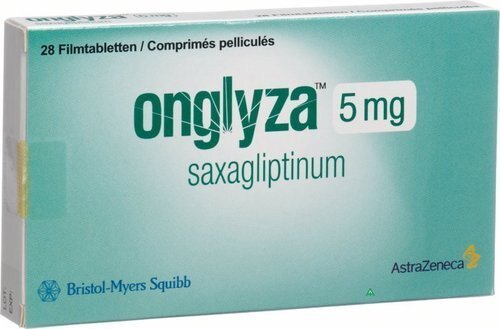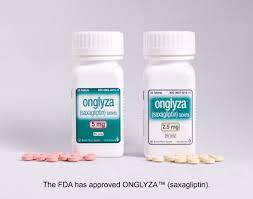- What Is Onglyza (Saxagliptin)?
- Ingredients
- Who Can Take Onglyza (Saxagliptin)
- Dosage Sizes
- Important Safety Information
- Contraindications
- Interactions
- Side Effects
- Overdose
- Storage
- Drugs Similar to Onglyza (Saxagliptin)
- How can I get Onglyza OTC?
- Delivery
- FAQ
- Can Onglyza be used for Type 1 diabetes?
- Are there any dietary restrictions while taking Onglyza?
- Can Onglyza cause weight gain?
- How often should kidney function be monitored while on Onglyza?
- Is Onglyza safe for use during pregnancy?
- Can Onglyza be taken with other diabetes medications?
- Does Onglyza interact with common pain medications like ibuprofen?
- Can I take Onglyza if I have a history of heart disease?
- What should I do if I miss a dose of Onglyza?
- Can Onglyza be crushed or split for easier administration?
What Is Onglyza (Saxagliptin)?
Onglyza, or saxagliptin, is an oral medication commonly prescribed to manage Type 2 diabetes. It belongs to a class of drugs known as dipeptidyl peptidase-4 (DPP-4) inhibitors, which work by increasing the levels of incretin hormones in the body. These hormones help regulate blood sugar by stimulating insulin release and reducing glucose production in the liver. Onglyza is typically used with diet and exercise to improve glycemic control in adults with diabetes. As with any medication, it’s essential to consult a healthcare professional to determine its suitability for individual cases and discuss potential side effects and interactions with other medications.
NDC Code(s): 0310-6100-30, 0310-6100-90, 0310-6100-95, 0310-6105-30, 0310-6105-50, 0310-6105-90, 0310-6105-95

Ingredients
The active ingredient in Onglyza is saxagliptin hydrochloride. Saxagliptin is a dipeptidyl peptidase-4 (DPP-4) inhibitor, which means it works by blocking the action of the DPP-4 enzyme. This enzyme normally breaks down incretin hormones, increasing insulin release and decreasing glucose production. By inhibiting DPP-4, saxagliptin helps regulate blood sugar levels in individuals with Type 2 diabetes.
It’s important to note that while saxagliptin is the primary active ingredient, medications like Onglyza may also contain inactive ingredients, such as fillers, binders, and colorants. The specific formulation can vary between brand and generic versions of the medication, so it’s advisable to check the product’s package insert or consult a healthcare professional for precise information.
Who Can Take Onglyza (Saxagliptin)
Onglyza (saxagliptin) is typically prescribed for adults with Type 2 diabetes to help manage their blood sugar levels. It is not intended for use in individuals with Type 1 diabetes or diabetic ketoacidosis. Your healthcare professional will consider various factors before prescribing Onglyza, including your overall health, medical history, and any existing medications.
It’s essential to inform your healthcare provider about any existing medical conditions, such as kidney problems, as adjustments to the dosage may be necessary. Pregnant or breastfeeding individuals should also discuss the potential risks and benefits of Onglyza with their healthcare provider.
As with any medication, individual responses may vary, and only a qualified healthcare professional can determine if Onglyza is suitable for your specific case. Always follow your healthcare provider’s guidance and adhere to the prescribed dosage and instructions.
Dosage Sizes
The typical dosage of Onglyza (saxagliptin) can vary depending on individual factors and the specific recommendations of a healthcare professional. However, a standard starting dose for Onglyza is 2.5 or 5 milligrams once daily, taken with or without food. The dosage may be adjusted based on individual response and the need for glycemic control.
It’s crucial to follow your healthcare provider’s prescribed dosage and administration instructions. They may also adjust the dosage based on factors such as kidney function, as saxagliptin is eliminated primarily through the kidneys.
Never self-adjust the dosage without consulting your healthcare professional; always inform them of any changes in your health status or if you experience any side effects. Regular monitoring and communication with your healthcare provider are essential for effective diabetes management.
Important Safety Information
Onglyza (saxagliptin) comes with important safety information that individuals should know. It’s crucial to follow your healthcare provider’s guidance and inform them of any existing health conditions or medications you are taking.
If you have a history of hypersensitivity reactions to saxagliptin, it’s essential to avoid this medication.
There have been reports of pancreatitis (inflammation of the pancreas) using saxagliptin. Inform your healthcare provider if you experience persistent severe abdominal pain.
Saxagliptin has been associated with an increased risk of heart failure, particularly in patients with a history of heart disease. Inform your healthcare provider of any symptoms of heart failure, such as shortness of breath or swelling.
Some individuals may experience joint pain while taking saxagliptin. If you develop severe and persistent joint pain, consult your healthcare provider.
When used in combination with certain other diabetes medications, saxagliptin may increase the risk of hypoglycemia. Be vigilant for symptoms such as shakiness, sweating, and confusion.
Since saxagliptin is eliminated through the kidneys, dosage adjustments may be necessary for individuals with impaired kidney function.
Always take Onglyza as prescribed and attend regular follow-up appointments with your healthcare provider for monitoring. If you experience any unusual or severe side effects, seek medical attention promptly. This information is a general overview, and it’s crucial to refer to the specific safety information provided by the medication’s manufacturer and your healthcare provider.

Contraindications
Onglyza (saxagliptin) has specific contraindications, meaning there are circumstances under which medication use is not recommended. It’s important to discuss these with your healthcare provider. Contraindications for Onglyza may include:
- Hypersensitivity: If you have a known hypersensitivity or allergy to saxagliptin or any of the inactive ingredients in the medication, its use is contraindicated.
- Type 1 Diabetes: Onglyza is indicated for the management of Type 2 diabetes and is not suitable for individuals with Type 1 diabetes.
- Diabetic Ketoacidosis: Onglyza should not be used in individuals with diabetic ketoacidosis, a severe complication of diabetes characterized by high blood sugar and the presence of ketones in the blood.
- End-Stage Renal Disease: Onglyza is not recommended in individuals with end-stage renal disease or those undergoing dialysis.
- Severe Hepatic Impairment: If you have severe hepatic (liver) impairment, the use of Onglyza may not be suitable.
Always inform your healthcare provider about your complete medical history, including any existing conditions or medications you are taking, to ensure that Onglyza is safe and appropriate for you. Consult your healthcare professional promptly if you have concerns or experience any adverse effects.
Interactions
Onglyza (saxagliptin) may interact with other medications, potentially affecting their efficacy or increasing the risk of side effects. Inform your healthcare provider about all medications, supplements, and herbal products you are taking. Some potential interactions with Onglyza include:
- Insulin or Insulin-Secretagogues: The risk of hypoglycemia (low blood sugar) may increase when Onglyza is combined with insulin or medications that stimulate insulin secretion.
- Certain Diuretics (Thiazides): Concomitant use of saxagliptin with certain diuretics may increase the risk of hypotension (low blood pressure).
- CYP3A4/5 Inhibitors: Medications that inhibit the CYP3A4/5 enzyme system may affect the metabolism of saxagliptin. This includes certain antifungal medications, macrolide antibiotics, and some protease inhibitors.
- Rifampin: Rifampin, an antibiotic, may decrease the effectiveness of saxagliptin.
- Digoxin: Co-administration of Onglyza with digoxin may increase digoxin concentrations. Monitoring of digoxin levels is recommended.
- H2 Receptor Antagonists: Some H2 receptor antagonists (used to treat stomach acid issues) may affect the absorption of saxagliptin.
This is not an exhaustive list, and individual responses to drug interactions can vary. Always consult with your healthcare provider before starting, stopping, or changing the dosage of any medications while taking Onglyza. Regular communication with your healthcare team is crucial for safe and effective diabetes management.
Side Effects
Like any medication, Onglyza (saxagliptin) can cause side effects. It’s essential to be aware of potential adverse reactions and seek medical attention if you experience any unusual or severe symptoms. Common side effects of Onglyza may include:
- Upper Respiratory Tract Infection: Nasopharyngitis, upper respiratory tract infections, and similar symptoms are common side effects.
- Headache: Some individuals may experience headaches while taking saxagliptin.
- Urinary Tract Infection: Infections of the urinary tract can occur.
- Nasal Congestion: Congestion or a runny nose may be observed.
- Pancreatitis: While rare, saxagliptin has been associated with an increased risk of pancreatitis. Seek medical attention if you experience persistent severe abdominal pain.
- Hypoglycemia: When used in conjunction with other diabetes medications, saxagliptin may increase the risk of hypoglycemia (low blood sugar). Be aware of symptoms such as shakiness, sweating, and confusion.
- Joint Pain: Some individuals may experience joint pain.
It’s crucial to report any side effects to your healthcare provider. Additionally, seek emergency medical attention if you experience symptoms of a severe allergic reaction, such as swelling, rash, or difficulty breathing.
This is not an exhaustive list of side effects; individual responses may vary. Your healthcare provider can provide more detailed information based on your medical history and specific circumstances.

Overdose
If you suspect an overdose of Onglyza (saxagliptin), it’s crucial to seek immediate medical attention. Overdose symptoms may include hypoglycemia (low blood sugar), and in severe cases, it can lead to serious complications.
Common signs of hypoglycemia may include:
- Shakiness or trembling
- Sweating
- Rapid heartbeat
- Confusion
- Headache
- Blurred vision
- Seizures
If you or someone else is experiencing these symptoms and there’s a suspicion of an overdose, it’s important to call emergency services or go to the nearest emergency room. Be prepared to provide information about the amount of medication taken and any other relevant details.
Remember, never attempt to manage a potential overdose on your own. Emergency medical professionals are trained to handle such situations and can provide the necessary care to address the overdose effects and stabilize blood sugar levels.
Storage
Store Onglyza at room temperature, away from extreme heat or cold. Avoid exposure to temperatures above 86°F (30°C) or below 59°F (15°C).
Keep the medication in its original container with the lid tightly closed to protect it from moisture. Avoid storing it in the bathroom where humidity levels can be high.
Protect Onglyza from direct sunlight. Store it in a cool, dark place.
Store medications in a location that is inaccessible to children and pets to prevent accidental ingestion.
Keep Onglyza in its original packaging with the prescription label intact. This helps you and healthcare providers easily identify the medication and its instructions.
Always check the specific storage instructions on the medication packaging or consult your pharmacist if you have any concerns. If you ever have doubts about the quality or safety of your medication, consult your healthcare provider or pharmacist.
Drugs Similar to Onglyza (Saxagliptin)
Saxagliptin, the active ingredient in Onglyza, belongs to the class of medications known as dipeptidyl peptidase-4 (DPP-4) inhibitors. Several other DPP-4 inhibitors are available as alternatives or generics. Here are some examples:
- Sitagliptin (Januvia): Similar to saxagliptin, sitagliptin is another DPP-4 inhibitor used to manage Type 2 diabetes.
- Linagliptin (Tradjenta): Linagliptin is another DPP-4 inhibitor used to improve glycemic control in adults with Type 2 diabetes.
- Alogliptin (Nesina): Alogliptin is also a DPP-4 inhibitor prescribed for treating Type 2 diabetes.
These medications work by increasing the levels of incretin hormones, which help regulate blood sugar levels. While they share a common mechanism of action, individual responses to different DPP-4 inhibitors can vary, and your healthcare provider will consider various factors when determining the most suitable medication for you.
It’s important to note that while generic versions of saxagliptin may be available, they might differ from the brand name Onglyza.
How can I get Onglyza OTC?
You can buy Onglyza in online pharmacies.
Delivery
USA, Great Britain (UK), Cyprus, France, Slovakia, Austria, Spain, Canada, Mexico, Australia, New Zealand and etc.
FAQ
Can Onglyza be used for Type 1 diabetes?
No, Onglyza is specifically indicated for the management of Type 2 diabetes and should not be used in individuals with Type 1 diabetes.
Are there any dietary restrictions while taking Onglyza?
There are no specific dietary restrictions, but following a balanced diet, as your healthcare provider recommends, is essential to help manage blood sugar levels effectively.
Can Onglyza cause weight gain?
Weight gain is not a common side effect of Onglyza. Some individuals may experience weight loss due to improved glycemic control.
How often should kidney function be monitored while on Onglyza?
Your healthcare provider will determine the appropriate frequency of kidney function monitoring, especially if you have pre-existing kidney conditions. Regular check-ups are typically recommended.
Is Onglyza safe for use during pregnancy?
Pregnant individuals or those planning to become pregnant should discuss the potential risks and benefits of Onglyza with their healthcare provider. Individual cases may vary.
Can Onglyza be taken with other diabetes medications?
Onglyza is often prescribed in combination with other diabetes medications, but the specific combination depends on individual needs. Always follow your healthcare provider’s recommendations.
Does Onglyza interact with common pain medications like ibuprofen?
While interactions with pain medications are generally uncommon, it’s essential to inform your healthcare provider about all medications, including over-the-counter drugs, to prevent potential interactions.
Can I take Onglyza if I have a history of heart disease?
Individuals with a history of heart disease should discuss the potential risks and benefits of Onglyza with their healthcare provider. It may be prescribed cautiously, considering the individual’s overall health.
What should I do if I miss a dose of Onglyza?
If you miss a dose, take it as soon as you remember. If it’s almost time for the next dose, skip the missed dose and resume your regular schedule. Do not double up to make up for a missed dose.
Can Onglyza be crushed or split for easier administration?
Onglyza tablets should not be crushed or split. They should be taken whole with or without food, as directed by your healthcare provider.



































